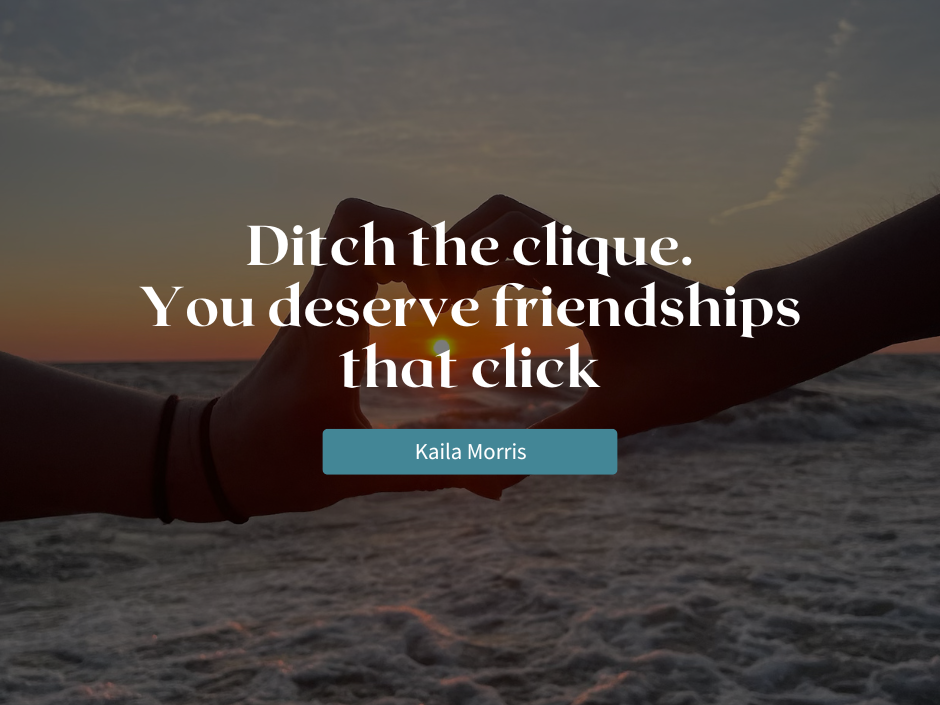Ditch the clique. You deserve friendships that click
- Kaila Morris

- Nov 3, 2025
- 4 min read

I regularly find myself in conversations in which I feel—with the highest levels of confidence and rationality—that my counterpart has zero interest in what I have to say. More than that, I can actually feel the disinterest radiating from their body, as my soul sinks with their drooping eyes.
A few seconds later, their friend walks by. Like clockwork, they spring from their seat, color seeping back into their face and body. “Gottagobye,” they say as they walk away, not sparing me so much as a second glance.
For the longest time, I thought that I was the common denominator in these situations, the obvious problem. Surely I was boring, or awkward, or some other trait, to warrant such consistent disregard. But you know what? I’m not. So I think that actually, their reactions have nothing to do with me.
When I went on my whole self-love journey last year, I decided to give myself the benefit of the doubt in social situations—and I’ve extended that mindset to other people, too. “They’re probably stressed,” I like to tell myself, after an instance of blatant disregard. “Or tired, or hungry, or caught up in their own thoughts.”
For the sake of my sanity, I choose to believe these things are true. I also acknowledge that there are times when I am, honestly, a dull conversationalist. But sometimes, there’s this thought that sneaks into my head, no matter how much I try to ignore it. A thought that says…sometimes, people are just cliquey.
My inner idealist prefers to think the best in people, but I’m not naive. Social cliques exist long after high school. There will always be people in life who prefer “their” people—their established social order. These are the ones who crowd you out of the circle at events, who give you the side-eye when you try to join their project group in class. The exclusionists.
I think that a lot of the times, exclusivity is more about comfort and routine than it is about malice. It’s forming a project group with friends the moment sign-ups open, without realizing we’ve left someone sitting alone. Talking about an inside joke that a new co-worker might not understand. Grabbing lunch with the same people every day because it’s easy, not knowing the routine makes others hesitant to join.
At what point do cliques become harmful? Personally, I think it comes down to self-respect. There’s a point at which cliques don’t just close others out; they make the rest of us question our own value, too.
Take this anecdote: My freshman year, when I got together with friends, they would gossip to one-another about drama with mutual friends of theirs with whom I wasn’t acquainted. Most of the time, this was a brief side-conversation, so inconsequential I barely noticed. There were occasions, though, with certain people, when the story started to dominate the main conversation… and it dawned on me that I was the only one in the room out of the loop. It’s in those kinds of moments, when I felt like a guest without an invitation at my own party, that I realized my place in the friendship.
I think the greatest danger of cliques is that those who exist outside of them feel such a pressure to give, to prove themselves worthy of membership, that they will settle for receiving less in return. A former friend once told me, six months into our friendship, that she would only befriend people who shared a certain identity with her—an identity that was outside the bounds of my own. This was someone I valued, someone who I didn’t want to lose. So there I was: acquainted with someone who clearly viewed me as outside her parameters of friendship, desperate to prove myself worthy of being liked.
When I look back on those days, I realize how much time I wasted trying to fit into a shape that was never designed for me to fill. While I was invited to hangouts, I was never quite welcomed. Introduced, not remembered. Included in Instagram posts, but—more often than not—taking the group photos. It was like I was the diversity hire, present in the group only to prove they didn’t have a bias. It wasn’t until I left that friendship that I realized how much better I deserved.
As I’ve grown older, I’ve come to understand that the best friends are the ones who champion your self-respect. They cherish reciprocity, never letting you give more than you take. They know your boundaries, and they follow them. They meet every deprecating comment you make with twice the positive reinforcement. Most important, I think, they don’t let you make excuses for others. If you aren’t treated the way you deserve to be treated, they will demand respect on your behalf.
My best friend always gets mad at me for stepping off the sidewalk when I see someone approaching from the other side. “There’s enough space for both of you,” she insists. “Why would you ever diminish your awesomeness, make yourself smaller, for someone who won’t ever appreciate the sacrifice?”
To care about someone enough to notice the way they quietly step aside, in every sense of the word… that’s true friendship. And I think that’s what we all deserve in the end: not just to be included, but to be chosen. To have people who make space beside us on the sidewalk, who click with us without making us earn a place.
Thanks for reading. Enjoy this piece? Subscribe or follow me on Instagram and LinkedIn for weekly updates. Your support means the world!




Comments